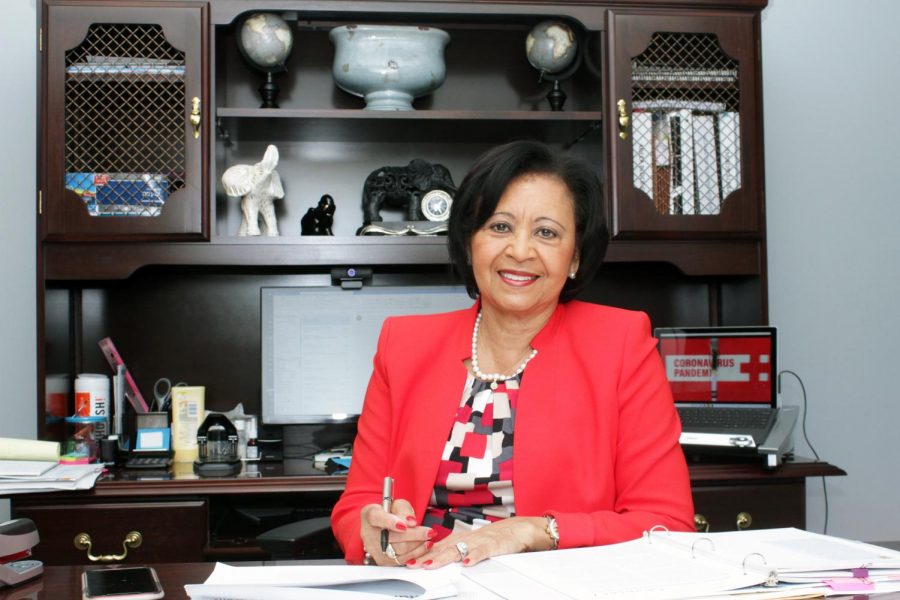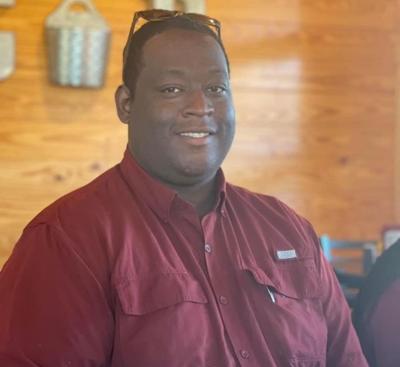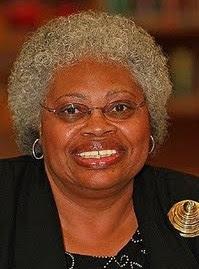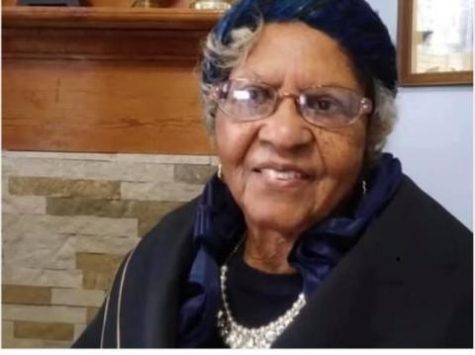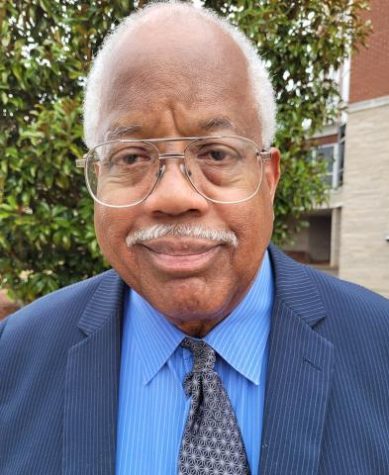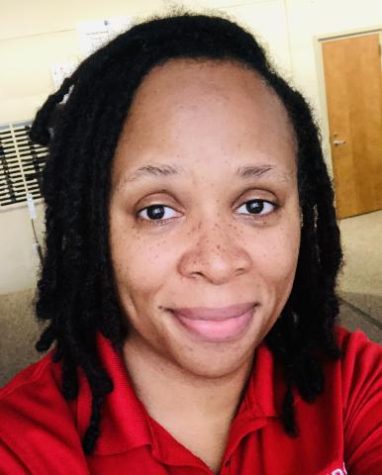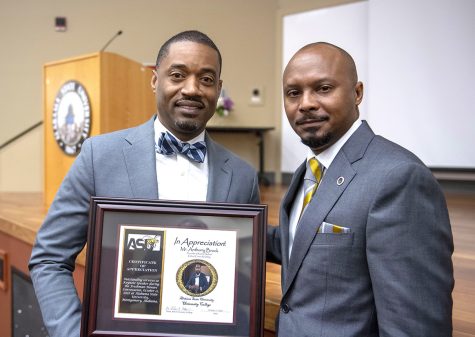Wright urges students to be their very, very best
Alabama State University alumna Catherine Wilson Wright, a native of Maplesville, Alabama, is currently the chief executive officer of Professional Development Services, LLC. Wright enjoyed a 32-year career with the federal government, a 10-year tenure with Trenholm State Community College and served as the chairwoman of the Alabama State University Board of Trustees
September 4, 2021
 The piece of advice most commonly given to young adults is to make the most out of every moment, and opportunity presented. There are countless programs, organizations, lectures, and more to steer one in the right direction as college students.
The piece of advice most commonly given to young adults is to make the most out of every moment, and opportunity presented. There are countless programs, organizations, lectures, and more to steer one in the right direction as college students.
What happens when one does make the most out of every moment, and opportunity presented and steps through every door placed in front of them? They eventually begin building the doors for the next generation.
Alabama State University alumna Catherine Wright did just that. Using her decades of experience in business, she now heads a consulting agency where she helps businesses and systems reach their highest potential.
“My goal was that all of those who worked under me had every opportunity to grow, to learn, and make a better living for themselves,” she said.
Originating from Maplesville, Alabama, in Chilton County, Wright grew up as one of eight children to the late Alice Watkins Wilson Cox Young and Jack Wilson. While growing up, she spent ample time on her grandparent’s farm, where she adopted the childhood dream of becoming a cowgirl.
“They had a horse,” she said. “It was a beautiful white horse, and I guess I was always intrigued.”
From naming animals to helping in the kitchen and garden, Wright took part in all of the simple joys that came with farm life. She especially remembers spending time with her great grandmother Mary Hattie Gayle, the matriarch of the family.
“She was a great cook,” she said. “She was a great gardener. She raised beautiful flowers, especially sunflowers and almost everything else beautiful that you could put in a yard.”
Wright attended Chilton County Training School, a racially segregated school where there were not many extracurricular activities for her to participate in. Still, she took advantage of all the ones that were offered. She was a member of the 4-H Club, the drill team, Typing Club, the Honors Society, and the girls’ basketball team.
“Pretty much anything our school had we took part in,” she said. With there only being one activity she could not join, she jokes, “I would have loved to been in the choir, but I never acquired the choir skill.”
As the time neared to her high school graduation, Wright visited many of the career days and college fairs that her high school offered. With many of her teachers and the speakers at the fairs being Alabama State University graduates, she was exposed to a strong Hornet influence.
“Fortunately, we had a principal who was forward-thinking,” she said. “We just had a lot of influence from our teachers who we held to high esteem. We followed our mentors.”
She graduated as part of the last segregated class of Chilton County Training School in 1969 and began her Hornet experience shortly after.
After hearing about the promising future of those who study business, more specifically the financial disciplines, Wright enrolled at the university as an accounting major. While she always had a knack for numbers, she knew that accounting was the perfect fit.
“I never changed my major and minor from the time that I enrolled as a freshman,” she said. “I know that it is oftentimes not the case with freshmen as they do not know what they want to do. But I did, and I stuck with it.”
Still taking advantage of all programs offered, Wright was a member of the Honors Society, Young Women’s Society, Pep Squad, a representative for Abercrombie Hall, and the Student Government Association (SGA). She considers her work with SGA to be the most memorable as it allowed her to really become involved and engrossed with Hornet life.
“During the week of Homecoming, I do not think we ever went to sleep,” she said. “Just about everyone knew who we were on campus. We were a pretty strong organization.”
Her time with SGA allowed her to lead the organizing of major Hornet events such as building floats, working concerts, getting to meet notable figures like Lionel Richie, and much more.
“Those were the fibers that were woven into everything that we did as students at ASU,” Wright said. “The black and gold. Those types of things were just memory makers. There is nothing about college that I did not enjoy.”
She also appreciates the many faculty and staff members she encountered as a student. She specifically values her time spent with Johnnie Royster, who was then the secretary to the vice president of Student Affairs; Rose Robinson, vice president of Student Affairs; Thelma Rice, associate professor of mathematics; and Joseph Lacey, director of Student Accounts. She said that they led her in her path while also allowing her room to grow personally. They were a no-nonsense bunch, but it was all-out of love.
“They were nurturing, but they could also be like your mom and dad,” Wright said. “They would love you, but they would also discipline. They redirected our radical ideas in a way that you never felt intimidated, but you always knew it was for a better cause.”
Wright graduated from ASU in 1973 with a bachelor’s degree in accounting with an economics concentration. She began her federal career with Maxwell Air Force Base in Montgomery, Alabama, just three days after finishing her studies. Then 12 days later married her high school sweetheart, James Wright, Ed.D., also a native of Chilton County.
“I was off and running,” she said.
Hired as a management and cost analyst for Maxwell Air Force Base in 1973, Wright worked every day to research trends in cost, production, the efficiency of vendors, and other topics relating to finance. By being assigned to Maxwell’s adult education program, training airmen and officers, she was responsible for calculating costs of all resources necessary for their success. Her success in this position, along with her master’s in business administration from Auburn University earned in 1978, allowed her to climb the ranks, earning the managerial position of deputy director in 1979.
Years later, in 1985, Wright was selected by the executives of Maxwell AFB to serve as an instructor at the Department of Defense Professional Military Comptroller School. By teaching courses in budget, cost analysis, resource management, accounting, finance, and comptrollership, she guided the paths of over 240 individuals a year. Considering all high- ranking officials must attend the Comptroller school, she held an indirect, yet strong, influence on how things were to be run at the school and on the base. Teaching this course was a great accomplishment for Wright, as she was not enlisted herself.
“I was the first non-military person to be an instructor,” she said.
In 1988, she was appointed to her longest-running position. As the Deputy Comptroller, Wright was the senior executive level manager of the financial and management fields. Responsible for making financial and management decisions to high-ranking officials of the base, she oversaw the execution of all budgets and organizational plans within Air University, an institution of higher education headquartered at Maxwell AFB.
“We had to build [the budget],” Wright said. “We had to defend it. Then we had to execute it under federal compliance.”
In this position, she supervised the allocation of over $1 billion throughout the professions and education systems within the Air Force, impacting more than 350,000 individuals worldwide. She worked closely with officials of the Pentagon, state and local government officials, corporate CEOs, and other significant figures in society. In this position, Wright developed the Funding Allocation Prioritizing System (FAPS), a system that prioritized them sot pressing issues and expenses first, and then all others, to maximize funds and productivity. Though FAPS was initially launched at Maxwell, it has now been adopted by the United States Air Force as a whole.
“Was it easy,” Wright asked? “No! Did it make folks happy? Not necessarily, but they acknowledge that it allowed Maxwell as a whole to take a look at those things that are really important.”
In order to carry out all of those pressing obligations, Wright created a team of skilled and capable employees. Understanding her place of power, she worked to open doors and extend opportunities to any young adult willing to put in the work, especially young Hornets.
“Every ASU student who wanted a career in business that I had the opportunity to interview got one,” she said. “They are all over the Air Force right now… I was a springboard for young folk that might not have had that opportunity.”
In 2004, while also employed by Maxwell, Wright accepted a position as the principal liaison consultant for the Alabama State Department of Education. In this position, she specialized in organizing the development of management, faculties, organizational culture, resource allocation, and all things responsible for productivity within school systems.
Wright finished her career with Maxwell AFB in 2006 and with the Alabama State Department of Education in 2008. That same year, she began her career as the Dean of Finance and Administrative Services at Trenholm State Community College. In this position, she headed the budgeting, resource allocation, building and grounds management, federal compliance, and so much more.
Finally retiring in 2018, Wright believes the mass amount of skills accumulated over her career molded her into more than just an accountant.
“Say you major in accounting,” she said. “As you grow through your career, you are no longer the accountant. You have grown latitudinally. You have become a manager, a leader, an organizer, and an executive. I held jobs where it was more important for me to be an effective leader than skilled in finance.”
Considering she took advantage of each opportunity presented to her over the years, along with her willingness to learn and lead, Wright holds herself as a major force in the world of business. She now uses that expertise in the field of business consulting. Now the CEO of Professional Development Services (PDS), a consulting agency begun by her husband in 1989, Wright works toward developing deserving clients.
“We enable businesses to grow,” she said.
Within PDS, Wright primarily does development work with various school systems due to her husband having decades worth of history with the Alabama State Department of Education, administrative duties, and as a professor in the college of education at Auburn University. Partnering his experience in education and hers in business organization, they are the perfect duo for promoting overall efficiency within schools.
“With many of the school systems we are working with currently, it is related to assisting plans for bridging the equity gap that has resulted from COVID-19,” she said.
To these school systems, PDS offers a number of services to improve the quality of faculty, leadership training, culture, assessment scores, and much more. By keeping their client’s end goal in sight, they do all things possible for that success. For their small business clients, they provide more general services, assisting with budgeting, employee training, contract drafting, compliance, quality control, and all things necessary for overall development.
“We want to build capacity, whatever that may be,” Wright said. “We want to minimize the problems that a business or school system or a state agency may find.”
Not only does her decades worth of success make her qualified for her career of consulting, but also her decades worth of trials and tribulations. She acknowledges the many challenges placed before her were merely tests of her willpower, which she made sure to pass.
“Just being young, Black, and female in an all-white environment with mostly military men,” she said. “I was recruited as a quality graduate, which meant there was a label on my back. So the expectation was raised… that was not necessarily an obstacle because I took the opportunity that the government afforded me.”
Though she worked during a time and in a system often set against her, she found a simple way to stand her ground. By never accepting ‘no’ for an answer, she asserted her dominance but also forced her counterparts to rise to her level.
“If I am looking for a ‘yes’ answer, then let’s make it so,” Wright said. By possessing that ‘can-do’ attitude throughout her career, she still leaves each institution and business working within a better state than she found it.
“My glass is never half empty,” she said. “That is how I see life. There is always a way to do better, and there is always a way to be better.”
Expressing that the most fulfilling aspect of her work is having a role in others’ success, she finds joy in making life easier for her clients. She remembers her opportunity to work with a young female duo in their attempt to reap a profit from their used car lot. After providing the help and resources necessary, Wright predicted that they would achieve their profit goal in six months, they were able to hit it in three.
“That was probably my proudest moment of working with small businesses,” Wright said. “We could actually see that we made a difference.”
With her passion lying in the improvement of others, she hopes to have the lasting impact of being a door opener for all.
“I want people to develop and grow to their highest potential,” she said. “And if I can be a part of that, whether it is my community or my church or my school, if I touch it, I want it to be better.”
Almost five decades later, Wright continues to hold a deep appreciation for her time as a Hornet. Not only did ASU give her the necessary education for her field, but it also gave her confidence and conviction as it provided an atmosphere for her to grow into herself.
“You learn to appreciate the fact that you are in an environment where if you do the right thing, it is going to be good for you,” she said. “But if you made a bad turn, it is not your last turn.”
To the current students of ASU, she stresses the idea that college sets the tone for the real world. If one is productive at the Hornet’s Nest, there is no other choice than to be successful beyond it.
“Be your very, very best,” Wright said. “Represent your university, your family, and your community in the best possible way.”
She is eternally thankful to Hornet Nation as she said, “My foundation came from ASU. They are second to none in developing young minds and creating opportunities for young people.”
Knowing that ASU opened the first door to her long-running and fruitful career, she is a
proud member of the black and old gold!


